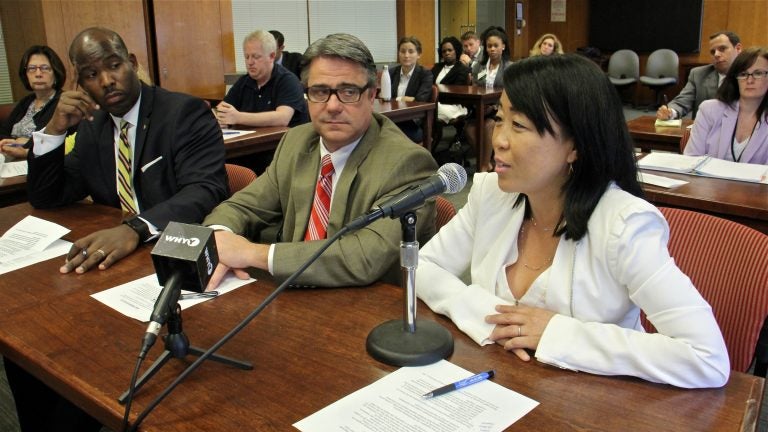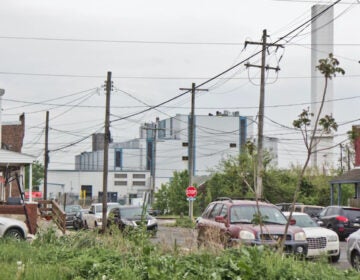Philly Ethics Board backs public financing for campaigns
Listen
Philadelphia City Council members (from right) Helen Gym, Bobby Henon and Derek Green appear before the city Board of Ethics to describe a campaign-finance proposal. (Emma Lee/WHYY)
The Philadelphia Board of Ethics has approved a proposal to use city tax dollars to fund the campaigns of candidates for political office in Philadelphia. The idea now goes to City Council, where enabling legislation has five co-sponsors.
Here’s a quick primer on the issue:
1. Philadelphia politicians, as a whole, don’t exactly have a reputation that would encourage voters to throw tax dollars their way. What’s the idea behind this?
Public financing of elections is an idea reformers have embraced in several places to reduce the influence of special interests and big money in campaigns. The idea is that if you can give deserving candidates a chance to run on their ideas with some public funding — instead of forcing them to spend all their time trying to court big donors — you’ll have better candidates, cleaner elections, and ultimately, people in office who will serve the public rather than the special interests that got them there.
2. So how would this work in Philadelphia — anybody on the ballot gets a check from City Hall?
No, it’s not that simple.
To qualify, you’d have be on the ballot and have an opponent, and, before you got any public funding, you’d have raise a certain threshold of contributions of $150 or less from residents of the district where you’re running.
So, for example, a district city council candidate would need to get $15,000 in contributions of $150 or less from citizens in his or her district. Once the candidate did that, he or she would be eligible for a four-to-one match of city dollars, up to a limit.
A candidate who raises $15,000 in smaller donations would find that the four-to-one match turns that into $75,000.
For a mayoral candidate to get the match, he or she would have to raise $50,000 from those small contributions, from citizens of Philadelphia.
Ethics board executive director Shane Creamer said that will have an effect on how city candidates campaign — and what they say.
“You need to concentrate your message for citizens of Philadelphia if you want to get those donations that are eligible for matching,” Creamer said, “and so you’re spending less time talking to the big donors that may or may not even be in Philadelphia.”
3. Would the system impose other restrictions on the candidates?
Yes, and this is one of the ways the system is supposed to help clean things up, besides providing financial assistance.
If a candidate enters the public financing system and gets the city matching dollars, there’s a limit on how much he or she can spend in the race. It’s $2 million in a mayoral primary, for example. There are also limits on how much candidates can accept from PACs and businesses.
Ethics board staffers say that, right now, they can’t constitutionally restrict what candidates spend or how much they take from special interests. It would be considered a violation of free speech.
But, in this system, the candidate voluntarily agrees to limit his or her spending, or what they take from PACs and businesses, in return for the matching funds. The hope is that means we get cleaner elections.
4. Wouldn’t a lot of candidates just decline the public funding if it restricts their ability to tap those big donors and spend more?
Yes, probably, but ethics board staffers say that in New York, where a system like this has been in place for more than a decade, candidates who opt out of the public-financing system generate suspicion among voters.
Participating in the system has become a kind of good government seal of approval that candidates want. That nudges them toward the system, with its restrictions on fundraising and spending.
5. So the ethics board likes it, and it goes next to City Council. Will there be opposition?
Sure. For starters, you’re talking about handing out taxpayer money to Philadelphia politicians. Who would have a problem with that?
But even if you can make the case that this would be an investment in cleaner elections and better government, expect debate about the cost.
My colleague Tom MacDonald caught up with Mayor Jim Kenney at an event Wednesday and asked what he thinks about the idea.
Kenney said money is always tight, and his priority is education.
“Although it’s a laudable goal to have public financing,” Kenney said, “for me to make a decision [whether] to publicly finance an election or to adequately fund our schools, schools will always win.”
Ethics board estimates suggest the Philadelphia public-financing system would cost a few million dollars every four years when we have a mayoral/City Council election and much less in other years.
It would amount to a tiny fraction of the city’s $4 billion annual budget, but every dollar counts.
The public-financing legislation has five co-sponsors — Bobby Henon, Derek Green, Maria Quiñones-Sánchez, Helen Gym and Mark Squilla.
A Council hearing on the proposal is expected sometime next month.
WHYY is your source for fact-based, in-depth journalism and information. As a nonprofit organization, we rely on financial support from readers like you. Please give today.





